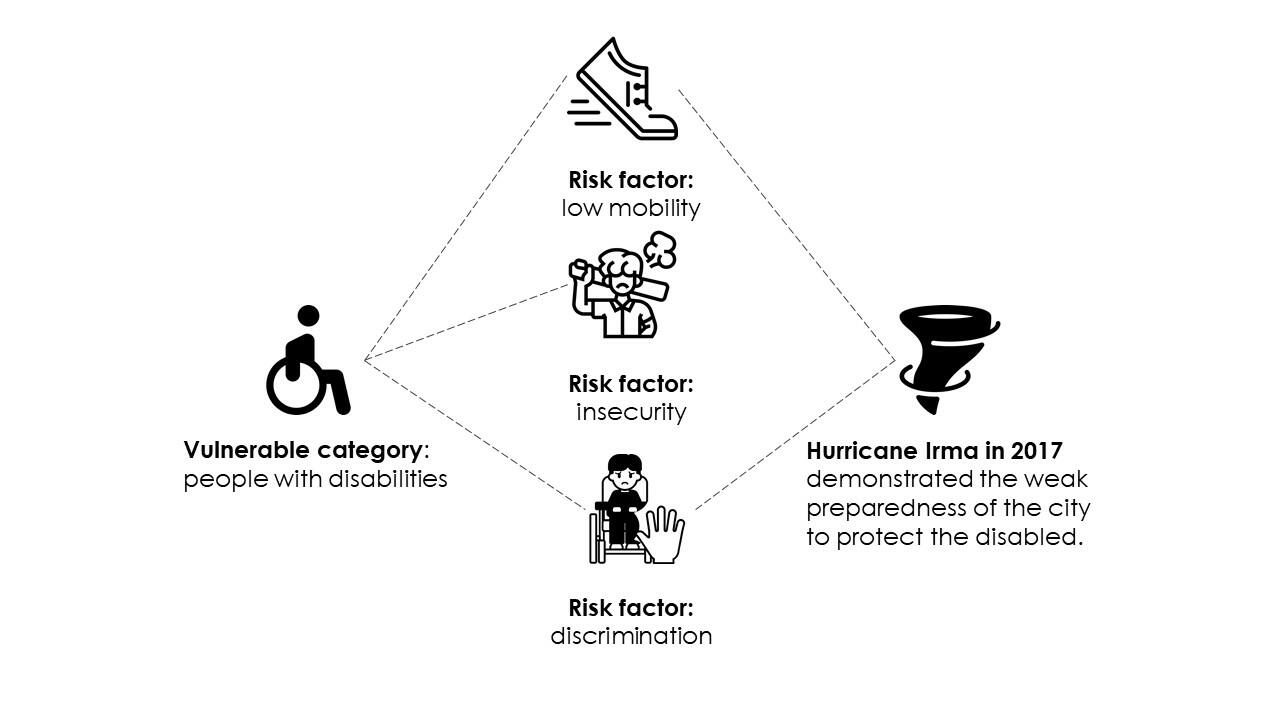There are many categories of people in the world that can be categorized as medically and socially vulnerable. Such people tend to be less fortunate than others. The category of people with disabilities requires additional attention as it has two significant risk factors: social and medical. Being blind or chained to a wheelchair, persons with disabilities regularly face difficulties. The coastal city of Miami is not poor for people with disabilities, although it does show some significant shortcomings. The purpose of this essay is to identify the main risk factors faced by people with disabilities in Miami and to discuss a national program to help them.

In terms of the definition, a person with a disability is defined as a citizen who has a persistent impairment due to significant illness, illness, or injury. As a rule, such impairments are caused by the negative impact of trauma, occupational factors, or genetic mutations. As a result, such people have a disability and require ongoing medical and social protection. The vulnerability of people with disabilities is that they face particular risks to their lives (Newman, 2015).
Being less employable and mobile, people with disabilities are more likely to struggle for their lives. They regularly face both natural and social challenges. Solving difficulties largely determine the ordinary course of life of such people: if the problem is stronger than the capabilities of the disabled person, they are forced to endure pressure. Those chained to a wheelchair may experience significant restrictions on movement in the city (Newman, 2015). If the track width of roads, stairs, and doors in public places are not designed for a wheelchair, the person will feel uncomfortable. The situation is exacerbated if an un-equipped area is vital for a disabled person, such as a pharmacy or clinic.
The second important risk factor that people with disabilities face daily is medical and social insecurity. People with disabilities are generally several times more likely to experience domestic violence than healthy people because they are less physically developed (Weissman, 2015). While women with disabilities may experience sexual abuse, men with disabilities experience physical pressure (Weissman, 2015).
Violent methods are used by both relatives, particularly families, and social workers to help people with disabilities with rehabilitation. Disability prevents people in Miami from fulfilling their social role. According to Newman (2015), people with disabilities are often discriminated against in employment because of their physical or mental disabilities. These risk factors can also be linked to the inability to access education, housing, and health and social services (Newman, 2015). Existing national programs are aimed at, among other things, identifying and addressing such cases.
Miami is known to be a coastal city in the state of Florida, most commonly dominated by the tropical monsoon climate. Although the weather for this climate is relatively stable, Miami is threatened by storms and hurricanes coming from the Atlantic Ocean.
A striking example of the risk faced by disabled people who used wheelchairs is the events of 2017, in the fall of which a powerful Atlantic hurricane, Hurricane Irma, demonstrated Miami’s poor infrastructure for people with disabilities (Stein, 2018). Despite the devastating power of the storm for the entire city, the people with disabilities suffered the most damage. During such disasters, there is an evacuation program in significant towns that involves humanitarian assistance to the population.
People are usually evacuated to specialized places where they are collected. According to Stein (2018), such sites in Miami are not suitable for people with disabilities: there are no facilities to stay there. The specific problems that the author describes are the lack of sleeping places and medical assistants. Also, the effects of the hurricane are damaging the city’s infrastructure, which positively affects the movement of people with disabilities.
It is fair to say that Miami has and is developing national programs to support people with disabilities. One such program is the massive D-SNAP program, which aims to provide material support to people with disabilities after natural disasters. D-SNAP is being implemented by giving benefits and food to people with disabilities who have experienced difficulties due to natural disasters (Taveras, 2018). The system has been repeatedly criticized for discriminating against people with disabilities due to their inability to stand a long line for food, but after the trial, the organizers of D-SNAP still assisted all those in need (Taveras, 2018).
States need to make more significant efforts to ensure that people with disabilities do not experience discomfort in all situations. To this end, it is possible to adopt a strategy whereby every person with a disability has a mandatory (but only at his or her request) medical assistant who takes care of the person and monitors his or her health. Such an assistant will help the disabled person with difficulties in moving or shopping in a shop. In addition, the represented assistant will defend the interests of the disabled person in case of employment or discrimination.
In conclusion, as one of the most affected population groups, people with disabilities regularly face risk factors. Addressing these factors is not always possible, so people with disabilities find themselves under social and medical pressure. In Miami, these people have specific difficulties in moving around the city, finding work, and being physically and sexually abused in the home. Social programs are in place to address these issues and often show weak implementation. The Disability Strategy proposes the introduction of a medical assistant who will advocate for, support, and care for people with disabilities.
References
Newman, J. (2015). Identity and narrative: turning oppression into client empowerment in social security disability cases. Albany Law Review, 79(2), 373-402.
Stein, K. (2018). The elderly and disabled were left behind in Hurricane Irma. What will happen next time? Web.
Taveras, E. (2018). D-SNAP lawsuit. Web.
Weissman, D. M. (2015). Rethinking a new domestic violence paradigm. University Of Miami Race & Social Justice Law Review, 5(635), 635-660.